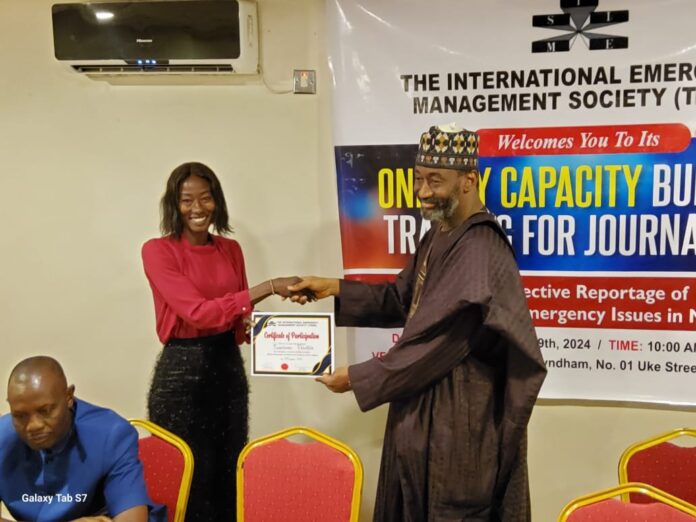By Joel Ajayi
The International Emergency Management Society (TIEMS), West Africa Chapter, has urged the media in the country to focus on effective and purposeful reporting of disaster management, ensuring that the general public receives only accurate information.
The stakeholders made this appeal on Thursday, in Abuja, at a one-day capacity-building workshop organized by TIEMS to enhance journalists’ skills for effective reporting on disaster crises and emergency issues.
The workshop targeted three key areas: crisis communication, crisis communication strategies, and navigating misinformation and public perception during emergencies. These topics served as an eye-opener for participants, who believe the training will significantly improve their reporting and enable them to mediate information, disinformation, and fake news.
The training program, themed “Strengthening Humanitarian Journalism: Enhancing Skills for Accurate and Ethical Reporting in Times of Crisis,” attracted publishers, founders of various media organizations, senior editors, and other leading figures in the Nigerian media industry, including representatives from the broadcast, print, and online segments.
Speaking at the event, the Chairman of TIEMS Nigeria, AVM Audu Bida, explained that the motivation behind the training was a deep commitment to improving the quality of information available about disasters. He noted that disaster events across the nation are often underreported, stressing the need for more comprehensive coverage.
According to him, “Unfortunately, we have a society that is not well-informed about handling disaster issues. Some are completely ignorant about their environment.”
“We rely on the media to enlighten the public about the consequences, hazards, and warnings related to disasters, and to alert the government for rescue and interventions. That is why we are here to provide this training, to better equip journalists in their duties, which will ultimately benefit society.”
He acknowledged the critical role of the media in educating, informing, raising awareness, sanitizing, and serving as the watchdog of society.
In his lecture, Mr. Sanya Adejokun, an editor with three decades of experience in disaster management, presented a paper titled “Understanding Disaster, Risk Reduction, and Management.” He examined the approach to disaster reporting and emphasized the importance of showing empathy toward victims while reporting. He noted that disasters will continue to occur, but it is essential to be prepared for them.
Mr. Yushau Shuaib, in his lecture on “Crisis Communication Strategies: Navigating Misinformation and Public Perception During Emergencies,” urged journalists to always verify their information and carefully edit before publication, stating that “fake news kills faster than a bullet.”
Academician Mr. Gbenga Morenikeji concluded the series of lectures with his topic, “Building Resilience through Media: The Role of Journalism in Shaping Public Perception and Behavior During Emergencies.” He encouraged journalists to seize the opportunity to improve their work, thereby contributing to a better society for all.
One of the participants, Rahila Garba, praised TIEMS for organizing the training, describing it as insightful and timely. She expressed that the training would greatly enhance the reporting of disasters and emergencies.





